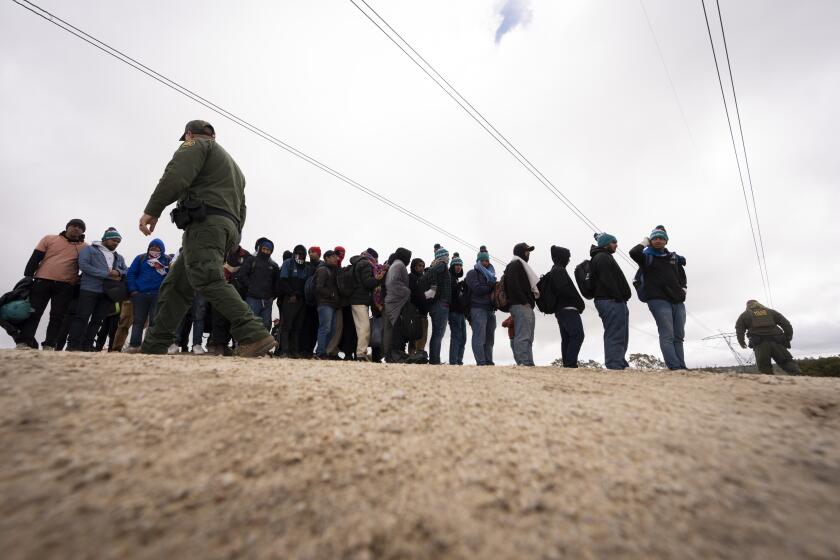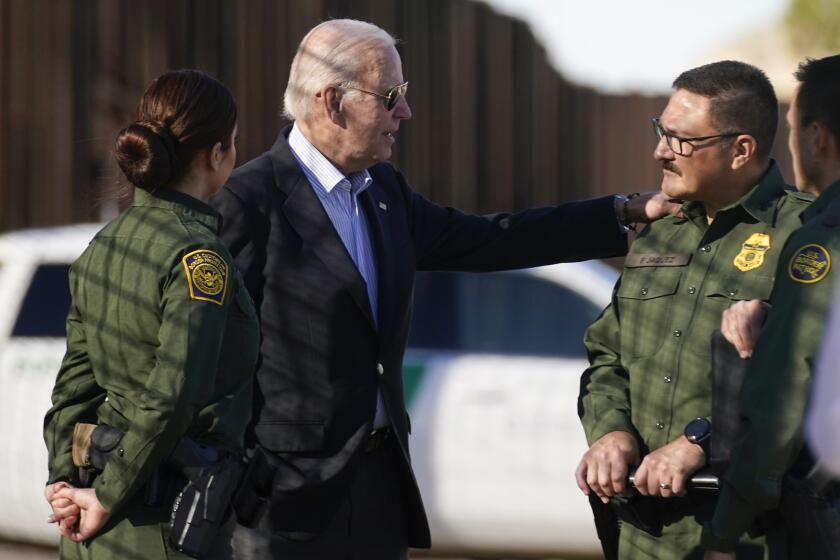When it comes to the U.S.-Mexico border, can people think beyond politics?

- Share via
I was not breaking any laws when I set out on foot to leave gallons of water on Bureau of Land Management lands in the Sonoran Desert in Arizona. I know this not because I’m an expert on such matters, but because I’m most decidedly not, and so I was going with someone who was, and who could explain the nuances as we hiked with the sloshing, heavy water on our backs.
If you leave water for distressed migrants who might find it after crossing the border illegally in certain places, including BLM lands, you are likely in the clear. But if you come across a distressed human and offer them water or a ride, you risk being arrested, prosecuted, fined and possibly jailed, depending on the circumstances.
Directly saving someone’s life can get you charged with a felony, even though, as my guide says, “we should prosecute people who don’t help a dying person.” To be human or to be safe from the law: That’s the question.
Expanding the criteria for asylum protection would make it easier to protect those who need it and reject those who don’t.
Besides legal issues, I was also grappling with white savior-dom. I know I am part of the problem, a citizen of a nation that has destabilized and exploited the areas from which so many migrants come. My one foray carting water into the desert won’t make up for that and is nothing compared to efforts of highly active locals like my guide. And it’s just a drop in the proverbial bucket against what global economic and policy change could accomplish.
But still, I heaved the water off my back and left it under a big plastic tub, which we weighted with rocks, in an area that our guide thought might be useful. I took in the expanse of organ pipe cactus with the sound of distant jets from the nearby bombing range echoing. And I considered how both laws and social pressures can convince us to either do, or not do, something of use. But also: What the hell. If someone came across a gallon of water and needed it, great.
The place spooked me out, I’ll admit, and I was happy when we went back to the car. There was an ominous feeling to the reality of walking in a place where some people are hiding, some people are looking, lots of people have guns, and everyone has different goals. It was as if the air was infused with the sorrow that underlies conflict. But mostly, it was just so very darn remote and I didn’t like feeling that alone.
The president wants to limit asylum seekers entering the U.S. But cruelty will increase border chaos, not win the election.
On the way back, we spoke of the “proximity principle,” which posits that humans tend to care most about what they can witness or feel. That’s understandable. As a novelist, though, I’ve always been intrigued by the ways humans can tune in — or not — to issues beyond their purview, and how fiction can expand that proximity. I believe in the power of effective and connective storytelling to increase empathy. After all, there is a science to making people care, and it’s all about communication.
The U.S.-Mexico border is mostly discussed in relation to politics, and which party is to blame for the many migrants seeking legal asylum here. But the individuals crossing into the United States in secret are a prime example of the out-of-sight, out-of-mind problem. Because of the border’s numerous crossing points and the fact that so many migrants wish to be unseen, there isn’t much proximity to be had. This is why myriad ethical and humanitarian border issues are so easily ignored.
But that does not mean that mass suffering is not occurring. Indeed, my guide explained that this remote area is one of the deadliest. Fundamental policy shifts need to occur, obviously, but in the meantime, groups such as No More Deaths and the various Samaritan groups, as well as regular citizens, leave water, cans of beans, blankets.
Clearly, while the landscape feels empty, not all are empty of empathy.
The night of our water drop I gathered around a bonfire with some locals, including one who had been famously arrested, charged, and then acquitted by a federal jury for offering humanitarian aid to migrants. The conversation kept landing on this area’s unique unseen-ness. After all, these drops are for the vague idea of a person, not someone you’ll likely see.
Also unseen is the environmental damage exacerbated by climate change: Depleted wetlands, interrupted animal migrations routes and ruined remote sacred spots are not always visually evident. And what about the invisible damage to human relationships? The Tohono O’odham people, for example, have been split apart, and those on the U.S. side can no longer visit relatives in Mexico easily. All this matters a great deal, whether we see it or not.
As the night wrapped up, the stars bright in the cold sky, I asked everyone what they wished people knew about this contested landscape. In one way or another, they all said the same thing: So many don’t see what’s going on out here. We wish they could see.
I believe we’re up to the task. That we can resist the urge to care about only what we witness firsthand. That, via the work people do and the stories people tell, we can recognize that unseen lives are meshed with our own lives more than we think, and that they matter.
The protagonist of Laura Pritchett’s latest novel, “Three Keys,” makes a water drop and grapples with questions of invisibility on a midlife coming-of-age journey.
More to Read
A cure for the common opinion
Get thought-provoking perspectives with our weekly newsletter.
You may occasionally receive promotional content from the Los Angeles Times.








